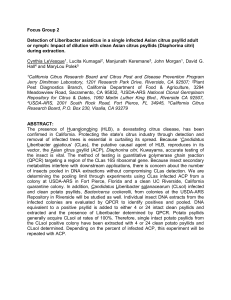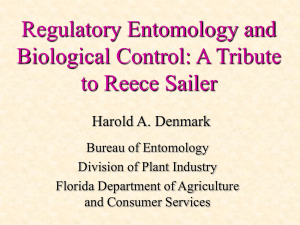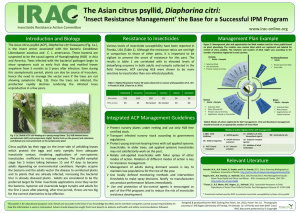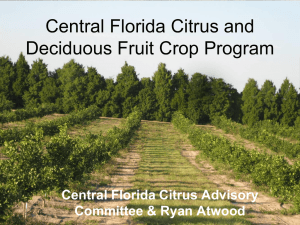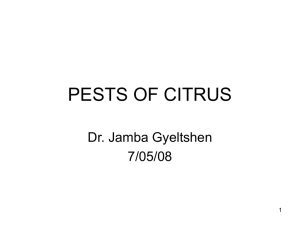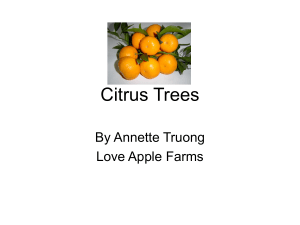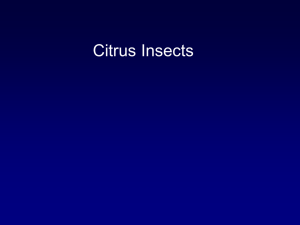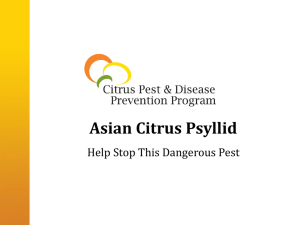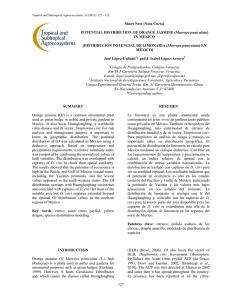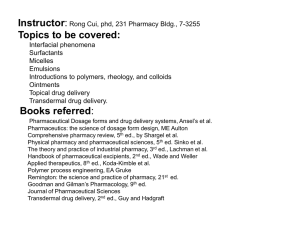Greening Host Range and Bacterial Diversity
advertisement
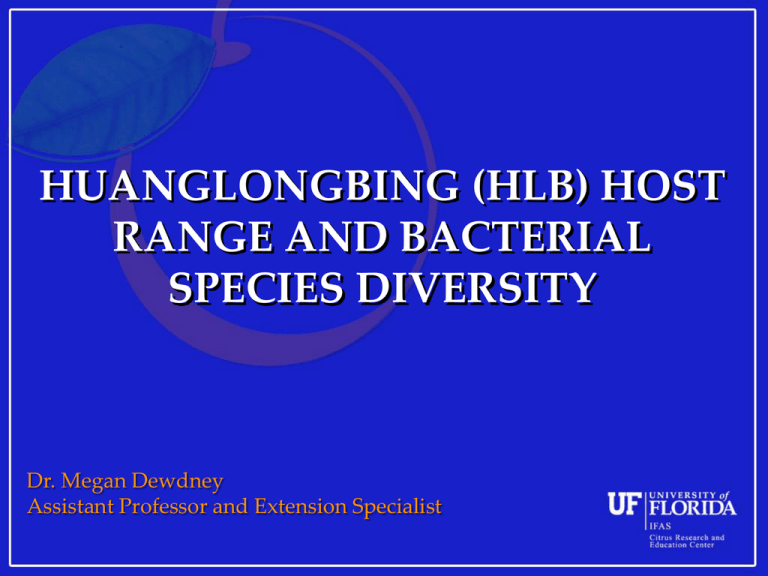
HUANGLONGBING (HLB) HOST RANGE AND BACTERIAL SPECIES DIVERSITY Dr. Megan Dewdney Assistant Professor and Extension Specialist Outline 1. The bacteria that cause HLB 2. Bacterial diversity in groves 3. Citrus host range of HLB Three Species of Bacteria Cause HLB • Ca. Liberibacter asiaticus – only known species in Florida • Vectored by 2 psyllid species – Diaphorina citri and Trioza erytreae (experimentally) • Heat tolerant • Found on the Indian Subcontinent, Southeast Asia, Arabian peninsula, Brazil, Louisiana and Florida Ca. Liberibacter africanus • Has not been found in Florida • Vectored by 2 psyllid species – Trioza erytreae and Diaphorina citri (experimentally) • Bacterium and vector heat sensitive • Found in many African countries, Madagascar and Yemen at higher altitudes Ca. Liberibacter americanus • Newest species of bacteria that cause HLB – Not found in Florida • Vectored by Diaphorina citri • Disease is not as severe as when caused by Asian species • Heat tolerant • Only found in Brazil currently • Is not found in citrus as often as in the past New Disease of Potato –Zebra Chip • Caused by a newly identified Ca. Liberibacter – Identified in New Zealand • Vectored by the potato/tomato psyllid – Bactericera cockerelli • Also damages tomatoes and peppers • From South Texas to Colorado as well as Mexico, Guatemala Bacterial Diversity Study 186 samples Asymptomatic grove 177 samples HLB infected grove Bacterial Diversity Study Symptomatic Groves Phylum Class Proteobacteria α Proteobacteria α –- proteobacteria Order Rhizobiales Rhizobiales Unclassified γ - proteobacteria Enterobacteriales Order % 91.5 91.5% Ca. Liberibacter spp. are with in the Bacteroidetes Unclassified RhizobialesUnclassified Firmicutes Bacilli Bacilliales 4.5 1.1 5.6 0.5 Bacterial Diversity Study Asymptomatic Groves Phylum Proteobacteria Class αα –- proteobacteria Order Rhizobiales Rhizobiales Unclassified β - proteobacteria Burkholderiales γ - proteobacteria Pseudomonodales Xanthomonadales Unclassified Unclassified Bacteroidetes Unclassified Unclassified Actinobacteria Actinobacteria Actinomycetales Deinococcusthermus Deinococci Deinococcales Order % 29% 29 3.2 15.6 5.9 0.5 43.0 0.5 2.2 Future Directions To look at bacterial populations before and after infection in: Asymptomatic HLB infected • Psyllids grove grove • Dodder Bacterial diversity of roots from both • Periwinckle asymptomatic and • Tobacco HLB infected groves HOST RANGE EXPERIMENTS Questionable whether resistance occurs in Citrus species and relatives Lots of ‘tolerance’ in greenhouse, but plants eventually die Even if tolerant citrus species are found, tolerance cannot be moved into commercial scions by conventional breeding Citrus varieties and relatives that have been inoculated 1 2 3 4 5 6 7 8 9 10 11 12 13 14 15 16 Citrus macrophylla (Alemow) Valencia Sweet Orange Flame Grapefruit Nules clementine (mandarin) Minneola Tangelo Eureka lemon Volkamer Lemon Persian lime Mexican lime Citron Carrizo Poncirus trifoliata Citrus halimii Citrus indica Citrus micanthra var. microcarpa Citrus ambyllocarpa 17 18 19 20 21 22 23 24 25 26 27 28 29 30 31 32 Sour orange Meiwa kumquat Khalily Citrus hystrix Swingle citrumelo Sun Chu Sha (mandarin) Palestine Sweet lime Murraya paniculata Citrus latipes Cleopatra mandarin Madam Vinous Sweet Orange Duncan grapefruit Ling Ping Yau pummelo Hirado Buntan Pink pummelo Siamese Sweet pummelo Severinia buxifolia • Research Results – No citrus cultivar or relative found to be resistant to HLB – Some cultivars more tolerant to HLB – Symptoms less severe Cleopatra mandarin Healthy Infected +++ Citrus macrophylla Healthy Infected +++ Relative number of Ca. Liberibacter cells Persian lime Healthy +++ Infected Mexican Lime +++ Citrus latipes + Volkamer Lemon +++ Sun Chu Sha (mandarin) +++ Valencia Sweet Orange +++ Flame Grapefruit ++ Khalily/Carrizo Conclusions • 3 species of Ca. Liberibacter are thought to cause HLB • Only one species is found in Florida • There is good association between symptoms and Ca. Liberibacter spp. • Citrus species vary in their symptoms of HLB • The severity of symptoms is not always associated with the number of Ca. Liberibacter in a plant Citrus Research and Education Center Dr. Ron Brlansky Dr. William Dawson Dr. Nian Wang
